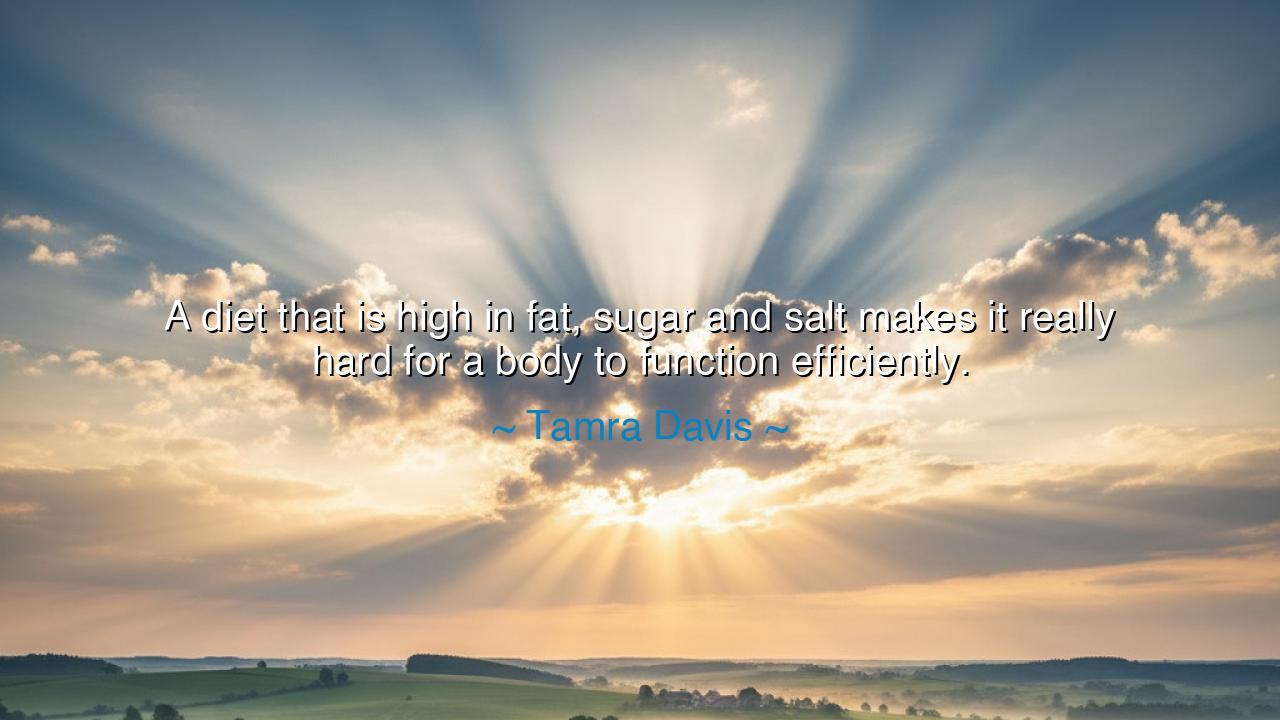
A diet that is high in fat, sugar and salt makes it really hard
A diet that is high in fat, sugar and salt makes it really hard for a body to function efficiently.






The words of Tamra Davis, “A diet that is high in fat, sugar, and salt makes it really hard for a body to function efficiently,” carry a wisdom that reaches beyond nutrition — they speak of balance, of discipline, and of the harmony between body and spirit. In this simple truth lies a universal law, one that the ancients knew well: that the body is the vessel of the soul, and what we feed it determines not only our strength, but our clarity, our energy, and our peace. When the body is burdened with excess, the spirit too becomes heavy; when the body is balanced, the mind moves like water — calm, pure, and alive.
In her words, Davis reminds us that the human form is not built to thrive on excess, for the laws of nature are written in moderation. The fat, the sugar, and the salt she names are not evils in themselves — for each, in its pure measure, is necessary to life — but when consumed without restraint, they corrupt the very systems they were meant to sustain. So it is with all things in life: too much of any pleasure turns medicine to poison. The ancients of Greece called this metron ariston — “moderation is best” — for they understood that strength does not come from indulgence, but from balance. The fire that gives warmth can also burn; the sweetness that nourishes can also rot.
The decline of the body, caused by poor nourishment, was often seen by the sages as a metaphor for the decline of civilization itself. Consider the fall of Rome, whose citizens, once hardy and disciplined, grew soft with luxury. The empire that had been built on grain and olive oil — simple, sustaining foods of the earth — gave way to feasts of excess: rich meats, honeyed wines, and salted delicacies from across the known world. As their diet grew heavier, so too did their spirit; they lost the edge of vigor and the focus of purpose. Thus, when Davis warns that an unbalanced diet makes the body “hard to function efficiently,” she echoes the same lesson the ruins of empires have long whispered: that decadence leads to decay, first of the flesh, and then of the will.
The body, in its wisdom, was not made for indulgence, but for harmony with nature. The ancients who lived closest to the land understood this truth instinctively. The farmers of ancient China followed the teachings of Huangdi, the Yellow Emperor, who taught that diet was the root of all health — that the balance of the five elements in food mirrored the balance of life itself. When they ate according to the seasons — greens in spring, fruits in summer, grains in autumn, and roots in winter — they found vitality and long life. But when they ignored the rhythms of nature, sickness followed. So too does the modern world, drowned in processed food and endless craving, suffer from its disconnection from the earth’s order.
And yet, there is hope — for discipline is not denial, but freedom. When one learns to nourish the body wisely, one rediscovers the joy of being alive. The body, freed from the chains of gluttony, moves with grace; the mind, no longer clouded by excess, sees clearly. This is why the sages of both East and West treated food as sacred. The Pythagoreans ate in silence, believing that each meal was a communion with the divine. They knew that to eat mindlessly was to insult the gift of life itself. Davis’s words are born from this same sacred understanding: that food is not just consumption, but connection — to life, to energy, and to purpose.
Let us also remember the story of Mahatma Gandhi, who through his long fasts and simple meals demonstrated that strength does not come from feasting, but from purity. His diet was one of necessity, discipline, and awareness — grains, fruits, and milk. Yet through this simplicity, he commanded the attention of nations. His body, though lean, was a vessel of power; his will, sharpened by moderation, became unbreakable. Gandhi’s life proves that self-control, even in diet, becomes a source of spiritual might. To feed the body with intention is to prepare the soul for greatness.
Let this, then, be the teaching: feed the body as you would tend to a sacred flame. Give it what it needs — not too much, not too little — that it may burn steadily and brightly through the years. Beware the seduction of the modern feast, where pleasure masquerades as nourishment and convenience hides decay. Choose foods that are alive, grown from the soil, kissed by sun and rain. Eat slowly, with gratitude, and let each bite remind you of your bond with the world.
For as Tamra Davis wisely says, when we drown the body in fat, sugar, and salt, we dull the instruments of life — our energy, our clarity, our spirit. But when we eat with reverence and balance, we restore the ancient harmony between flesh and soul. In that harmony, the body becomes strong, the mind becomes still, and the heart — light as air — remembers what it means to truly live.






AAdministratorAdministrator
Welcome, honored guests. Please leave a comment, we will respond soon